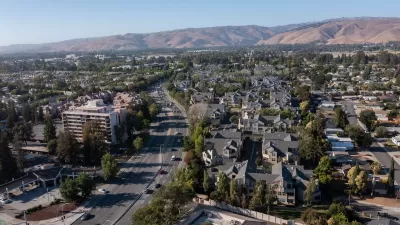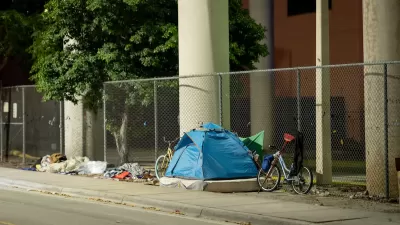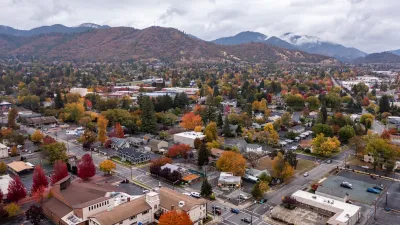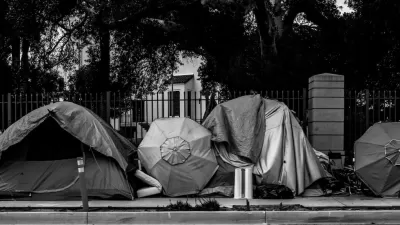Non-profits worry the ordinance, which does not explicitly exempt service providers, will have a chilling effect on unhoused residents and those who offer resources.

The San Francisco Bay Area city of Fremont passed one of the state’s most punitive laws against homeless residents, banning camping on public property and making it illegal to “permit, aid, or abet” encampments over the objections of non-profits and service providers. At the last count, Fremont had roughly 1,000 unhoused residents, while the city only provides 100 shelter beds.
As Dani Anguiano reports in The Guardian, “The city attorney said the ordinance does not make it illegal to provide food or aid to unhoused people. The council briefly considered amending the proposal to explicitly state that the ordinance would not affect aid workers but ultimately opted not to and the ordinance passed with just one councillor opposing it.”
The law has been widely condemned by advocates and civil rights groups. A letter to the city council signed by almost 20 groups stated that the ordinance would lead to “legal liability and devastating humanitarian consequences.” During the city council meeting when the council voted for the ordinance, hundreds of people showed up to protest the proposal, while other residents expressed support, citing concerns about safety.
Fremont is just one of many cities enacting laws targeting unhoused residents in the wake of the Supreme Court's Grants Pass v. Johnson decision last year, which allows cities to make houselessness illegal even when shelter space is not available.
FULL STORY: ‘Poverty is not a crime’: outrage after California city passes law targeting homeless encampments

Planetizen Federal Action Tracker
A weekly monitor of how Trump’s orders and actions are impacting planners and planning in America.

Congressman Proposes Bill to Rename DC Metro “Trump Train”
The Make Autorail Great Again Act would withhold federal funding to the system until the Washington Metropolitan Area Transit Authority (WMATA), rebrands as the Washington Metropolitan Authority for Greater Access (WMAGA).

The Simple Legislative Tool Transforming Vacant Downtowns
In California, Michigan and Georgia, an easy win is bringing dollars — and delight — back to city centers.

The States Losing Rural Delivery Rooms at an Alarming Pace
In some states, as few as 9% of rural hospitals still deliver babies. As a result, rising pre-term births, no adequate pre-term care and harrowing close calls are a growing reality.

The Small South Asian Republic Going all in on EVs
Thanks to one simple policy change less than five years ago, 65% of new cars in this Himalayan country are now electric.

DC Backpedals on Bike Lane Protection, Swaps Barriers for Paint
Citing aesthetic concerns, the city is removing the concrete barriers and flexposts that once separated Arizona Avenue cyclists from motor vehicles.
Urban Design for Planners 1: Software Tools
This six-course series explores essential urban design concepts using open source software and equips planners with the tools they need to participate fully in the urban design process.
Planning for Universal Design
Learn the tools for implementing Universal Design in planning regulations.
Smith Gee Studio
City of Charlotte
City of Camden Redevelopment Agency
City of Astoria
Transportation Research & Education Center (TREC) at Portland State University
US High Speed Rail Association
City of Camden Redevelopment Agency
Municipality of Princeton (NJ)





























